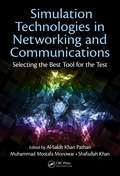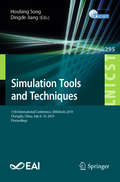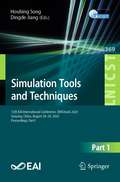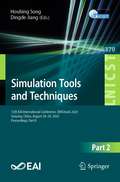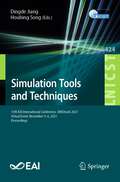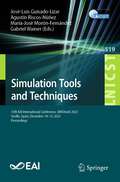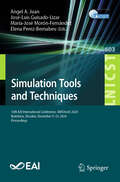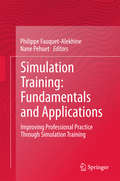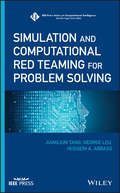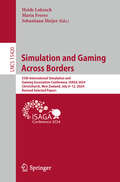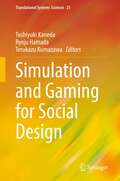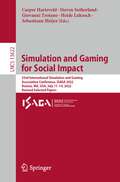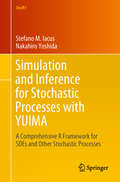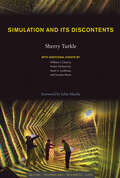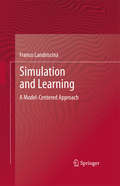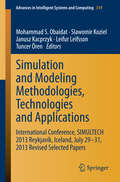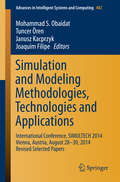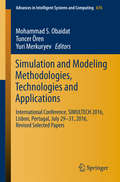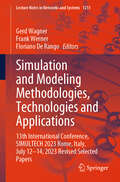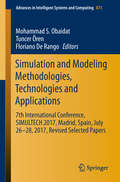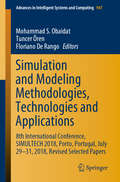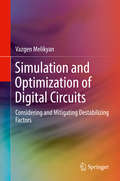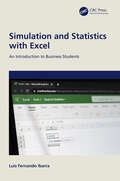- Table View
- List View
Simulation Technologies in Networking and Communications: Selecting the Best Tool for the Test
by Al-Sakib Khan Pathan Muhammad Mostafa Monowar Shafiullah KhanSimulation is a widely used mechanism for validating the theoretical model of networking or communication systems. Although the claims made based on simulations are considered to be reliable, how reliable they really are is best determined with real-world implementation trials. This book addresses various issues covering different mechanisms related to simulation technologies in networking and communications fields. Focusing on the practice of simulation testing instead of the theory, it reviews and evaluates popular simulation modeling tools and recommends the best tools for specific tests.
Simulation Tools and Techniques: 11th International Conference, SIMUtools 2019, Chengdu, China, July 8–10, 2019, Proceedings (Lecture Notes of the Institute for Computer Sciences, Social Informatics and Telecommunications Engineering #295)
by Houbing Song Dingde JiangThis volume constitutes the refereed post-conference proceedings of the 11th International Conference on Simulation Tools and Techniques, SIMUTools 2019, held in Chengdu, China, in August 2019. The 97 revised full papers were carefully selected from 156 submissions. The papers focus on simulation methods, simulation techniques, simulation software, simulation performance, modeling formalisms, simulation verification and widely used frameworks.
Simulation Tools and Techniques: 12th EAI International Conference, SIMUtools 2020, Guiyang, China, August 28-29, 2020, Proceedings, Part I (Lecture Notes of the Institute for Computer Sciences, Social Informatics and Telecommunications Engineering #369)
by Houbing Song Dingde JiangThis two-volume set constitutes the refereed post-conference proceedings of the 12th International Conference on Simulation Tools and Techniques, SIMUTools 2020, held in Guiyang, China, in August 2020. Due to COVID-19 pandemic the conference was held virtually. The 125 revised full papers were carefully selected from 354 submissions. The papers focus on simulation methods, simulation techniques, simulation software, simulation performance, modeling formalisms, simulation verification and widely used frameworks.
Simulation Tools and Techniques: 12th EAI International Conference, SIMUtools 2020, Guiyang, China, August 28-29, 2020, Proceedings, Part II (Lecture Notes of the Institute for Computer Sciences, Social Informatics and Telecommunications Engineering #370)
by Houbing Song Dingde JiangThis two-volume set constitutes the refereed post-conference proceedings of the 12th International Conference on Simulation Tools and Techniques, SIMUTools 2020, held in Guiyang, China, in August 2020. Due to COVID-19 pandemic the conference was held virtually. The 125 revised full papers were carefully selected from 354 submissions. The papers focus on simulation methods, simulation techniques, simulation software, simulation performance, modeling formalisms, simulation verification and widely used frameworks.
Simulation Tools and Techniques: 13th EAI International Conference, SIMUtools 2021, Virtual Event, November 5-6, 2021, Proceedings (Lecture Notes of the Institute for Computer Sciences, Social Informatics and Telecommunications Engineering #424)
by Houbing Song Dingde JiangThis proceedings constitutes the refereed post-conference proceedings of the 13th International Conference on Simulation Tools and Techniques, SIMUTools 2021, held in November 2021. Due to COVID-19 pandemic the conference was held virtually. The 63 revised full papers were carefully selected from 143 submissions. The papers focus on new results in the field of system modeling and simulation, software simulation, communication networks’ modeling and analysis, AI system simulation and performance analysis, big data simulation analysis, addressing current and future trends in simulation techniques. They are grouped in thematic aspects on wireless communication, big data, modeling and simulation, deep learning, network simulation and life and medical sciences.
Simulation Tools and Techniques: 15th EAI International Conference, SIMUtools 2023, Seville, Spain, December 14-15, 2023, Proceedings (Lecture Notes of the Institute for Computer Sciences, Social Informatics and Telecommunications Engineering #519)
by Agustín Riscos-Núñez José-Luis Guisado-Lizar María-José Morón-Fernández Gabriel WainerThis proceedings constitutes the refereed post-conference proceedings of the 15th International Conference on Simulation Tools and Techniques, SIMUTools 2023, held in Seville, Spain, in December 2023. The 23 revised full papers were carefully selected from 58 submissions. The papers focus on various areas such as Simulation Tools and Methods; Artificial Intelligence and Simulation; Transportation and Logistics; Medical Sciences; and Network Simulations.
Simulation Tools and Techniques: 16th EAI International Conference, SIMUtools 2024, Bratislava, Slovakia, December 9–10, 2024, Proceedings (Lecture Notes of the Institute for Computer Sciences, Social Informatics and Telecommunications Engineering #603)
by Angel A. Juan José-Luis Guisado-Lizar María-José Morón-Fernández Elena Perez-BernabeuThis book constitutes the refereed post-conference proceedings of the 16th EAI International Conference on Simulation Tools and Techniques, SIMUTools 2024, held in Bratislava, Slovakia, in December 2024. The 26 full papers included in this book were carefully reviewed and selected from 63 submissions. They were organized in topical sections as follows: simulation tools and methods, traffic simulations, logistics and manufacturing, robotics simulations, applications of simulations, and network simulations.
Simulation Training: Fundamentals and Applications
by Philippe Fauquet-Alekhine Nane PehuetDrawing on decades of industrial experience, this insightful and practical guide uses case studies and an interdisciplinary perspective to explain the fundamentals of simulation training to improve performance of high-risk professional activities. It seeks to identify those conditions under which simulation training has been shown to improve professional practice while employing extensive real examples. Simulation Training: Fundamentals and Application helps readers to develop their own synthesis of the simulation learning method and to use such training to enhance their skills and performance. Case studies demonstrate five specific theatres of professional practice - the nuclear-power industry, aeronautics, surgery, anesthesia and metallurgy - and then detailed analysis highlights the common factors and key results. The author's background as a Human Factors Consultant, Physicist and Physiologist has enriched studies of humans in work situations, work organization and management and he has also been involved in pedagogical conception of experimental training on simulators based on his experience as a safety expert on nuclear power plant. The book is useful to practitioners, researchers and students, both in industry and in university. It is clearly cross disciplinary as it presents and discusses applications in engineering, professional practice (airline pilots) and medicine.
Simulation and Computational Red Teaming for Problem Solving (IEEE Press Series on Computational Intelligence)
by George Leu Jiangjun Tang Hussein AbbassAn authoritative guide to computer simulation grounded in a multi-disciplinary approach for solving complex problems Simulation and Computational Red Teaming for Problem Solving offers a review of computer simulation that is grounded in a multi-disciplinary approach. The authors present the theoretical foundations of simulation and modeling paradigms from the perspective of an analyst. The book provides the fundamental background information needed for designing and developing consistent and useful simulations. In addition to this basic information, the authors explore several advanced topics. The book’s advanced topics demonstrate how modern artificial intelligence and computational intelligence concepts and techniques can be combined with various simulation paradigms for solving complex and critical problems. Authors examine the concept of Computational Red Teaming to reveal how the combined fundamentals and advanced techniques are used successfully for solving and testing complex real-world problems. This important book: • Demonstrates how computer simulation and Computational Red Teaming support each other for solving complex problems • Describes the main approaches to modeling real-world phenomena and embedding these models into computer simulations • Explores how a number of advanced artificial intelligence and computational intelligence concepts are used in conjunction with the fundamental aspects of simulation Written for researchers and students in the computational modelling and data analysis fields, Simulation and Computational Red Teaming for Problem Solving covers the foundation and the standard elements of the process of building a simulation and explores the simulation topic with a modern research approach.
Simulation and Gaming across Borders: 55th International Simulation and Gaming Association Conference, ISAGA 2024, Christchurch, New Zealand, July 8–12, 2024, Revised Selected Papers (Lecture Notes in Computer Science #15420)
by Sebastiaan Meijer Heide Lukosch Maria FreeseThis book constitutes the refereed proceedings of the 55th International Simulation and Gaming Association Conference, held in Christchurch, New Zealand, during July 8–12, 2024. The 20 full papers in this book were carefully reviewed and selected from 25 submissions. This year&’s theme has been Simulation and Gaming across Borders. The 2024 conference underscored the global and interdisciplinary reach of simulation and gaming as tools for education, research, and social change. The proceedings presented here capture the breadth of this convergence, highlighting innovative applications, emerging ethical considerations, intercultural dynamics, and new frontiers in facilitation techniques.
Simulation and Gaming for Social Design (Translational Systems Sciences #25)
by Toshiyuki Kaneda Ryoju Hamada Terukazu KumazawaThis book is a collection of research articles that deal with three aspects of simulation and gaming for social design: (1) Theory and methodology, including game system theory and agent-based modeling; (2) Sustainability, including global warming and the energy–food nexus);; and (3) Social entrepreneurship, including business, ethnic, and ethical understanding. The latter two especially form two major areas of clinical knowledge in contemporary life. Simulation and gaming, with its participatory approach, provides participants with a seamless integration of problem solving and education. It has been known as a tool for interdisciplinary communication since the 1960s, and now it is being developed to contribute to global society in the twenty-first century. This is the first book on simulation and gaming for social design that covers all aspects from the methodological foundations to practical examples in the fields of sustainability and social entrepreneurship. Regardless of the size of the problematics, societal system design involves (1) The visioning and conception aspects due to the long-term, overall nature of the goal; (2) Interdisciplinary thinking and communication for the exploration of new states of accommodation with technological systems; and (3) The “human dimension” aspect including education that must be dealt with, thus academic developments of simulation and gaming for social design as system thinking and practice methodologies are anticipated. Simulation and gaming has great potential for development as a tool to facilitate the transfer between theoretical and clinical knowledge.
Simulation and Gaming for Social Impact: 53rd International Simulation and Gaming Association Conference, ISAGA 2022, Boston, MA, USA, July 11–14, 2022, Revised Selected Papers (Lecture Notes in Computer Science #13622)
by Casper Harteveld Sebastiaan Meijer Heide Lukosch Steven Sutherland Giovanni TroianoThis book constitutes revised selected papers from the 53rd International Simulation and Gaming Association Conference, ISAGA 2022, which took place in Boston, USA, during July 11–14, 2022.The 15 full papers presented in this volume were carefully reviewed and selected from 35 submissions. They were organized in topical sections named: education and training; resilience and sustainability; health; and social justice.
Simulation and Inference for Stochastic Processes with YUIMA: A Comprehensive R Framework for SDEs and Other Stochastic Processes (Use R!)
by Stefano M. Iacus Nakahiro YoshidaThe YUIMA package is the first comprehensive R framework based on S4 classes and methods which allows for the simulation of stochastic differential equations driven by Wiener process, Lévy processes or fractional Brownian motion, as well as CARMA, COGARCH, and Point processes. The package performs various central statistical analyses such as quasi maximum likelihood estimation, adaptive Bayes estimation, structural change point analysis, hypotheses testing, asynchronous covariance estimation, lead-lag estimation, LASSO model selection, and so on. YUIMA also supports stochastic numerical analysis by fast computation of the expected value of functionals of stochastic processes through automatic asymptotic expansion by means of the Malliavin calculus. All models can be multidimensional, multiparametric or non parametric.The book explains briefly the underlying theory for simulation and inference of several classes of stochastic processes and then presents both simulation experiments and applications to real data. Although these processes have been originally proposed in physics and more recently in finance, they are becoming popular also in biology due to the fact the time course experimental data are now available. The YUIMA package, available on CRAN, can be freely downloaded and this companion book will make the user able to start his or her analysis from the first page.
Simulation and Its Discontents
by Sherry TurkleOver the past twenty years, the technologies of simulation and visualization have changed our ways of looking at the world. In Simulation and Its Discontents,Sherry Turkle examines the now dominant medium of our working lives and finds that simulation has become its own sensibility. We hear it in Turkle's description of architecture students who no longer design with a pencil, of science and engineering students who admit that computer models seem more "real" than experiments in physical laboratories. Echoing architect Louis Kahn's famous question, "What does a brick want?", Turkle asks, "What does simulation want?" Simulations want, even demand, immersion, and the benefits are clear. Architects create buildings unimaginable before virtual design; scientists determine the structure of molecules by manipulating them in virtual space; physicians practice anatomy on digitized humans. But immersed in simulation, we are vulnerable. There are losses as well as gains. Older scientists describe a younger generation as "drunk with code." Young scientists, engineers, and designers, full citizens of the virtual, scramble to capture their mentors' tacit knowledge of buildings and bodies. From both sides of a generational divide, there is anxiety that in simulation, something important is slipping away. Turkle's examination of simulation over the past twenty years is followed by four in-depth investigations of contemporary simulation culture: space exploration, oceanography, architecture, and biology. Simplicity: Design, Technology, Business, Life, edited by John Maeda
Simulation and Its Discontents (Simplicity: Design, Technology, Business, Life)
by Sherry TurkleHow the simulation and visualization technologies so pervasive in science, engineering, and design have changed our way of seeing the world.Over the past twenty years, the technologies of simulation and visualization have changed our ways of looking at the world. In Simulation and Its Discontents, Sherry Turkle examines the now dominant medium of our working lives and finds that simulation has become its own sensibility. We hear it in Turkle's description of architecture students who no longer design with a pencil, of science and engineering students who admit that computer models seem more “real” than experiments in physical laboratories.Echoing architect Louis Kahn's famous question, “What does a brick want?”, Turkle asks, “What does simulation want?” Simulations want, even demand, immersion, and the benefits are clear. Architects create buildings unimaginable before virtual design; scientists determine the structure of molecules by manipulating them in virtual space; physicians practice anatomy on digitized humans. But immersed in simulation, we are vulnerable. There are losses as well as gains. Older scientists describe a younger generation as “drunk with code.” Young scientists, engineers, and designers, full citizens of the virtual, scramble to capture their mentors' tacit knowledge of buildings and bodies. From both sides of a generational divide, there is anxiety that in simulation, something important is slipping away. Turkle's examination of simulation over the past twenty years is followed by four in-depth investigations of contemporary simulation culture: space exploration, oceanography, architecture, and biology.
Simulation and Learning
by Franco LandriscinaThe main idea of this book is that to comprehend the instructional potential of simulation and to design effective simulation-based learning environments, one has to consider both what happens inside the computer and inside the students' minds. The framework adopted to do this is model-centered learning, in which simulation is seen as particularly effective when learning requires a restructuring of the individual mental models of the students, as in conceptual change. Mental models are by themeselves simulations, and thus simulation models can extend our biological capacity to carry out simulative reasoning. For this reason, recent approaches in cognitive science like embodied cognition and the extended mind hypothesis are also considered in the book.. A conceptual model called the "epistemic simulation cycle" is proposed as a blueprint for the comprehension of the cognitive activies involved in simulation-based learning and for instructional design.
Simulation and Learning: A Model-Centered Approach
by Franco LandriscinaThe main idea of this book is that to comprehend the instructional potential of simulation and to design effective simulation-based learning environments, one has to consider both what happens inside the computer and inside the students' minds. The framework adopted to do this is model-centered learning, in which simulation is seen as particularly effective when learning requires a restructuring of the individual mental models of the students, as in conceptual change. Mental models are by themeselves simulations, and thus simulation models can extend our biological capacity to carry out simulative reasoning. For this reason, recent approaches in cognitive science like embodied cognition and the extended mind hypothesis are also considered in the book.. A conceptual model called the "epistemic simulation cycle" is proposed as a blueprint for the comprehension of the cognitive activies involved in simulation-based learning and for instructional design.
Simulation and Modeling Methodologies, Technologies and Applications
by Leifur Leifsson Slawomir Koziel Mohammad S. Obaidat Janusz Kacprzyk Tuncer ÖrenThis book includes extended and revised versions of a set of selected papers from the 3rd International Conference on Simulation and Modeling Methodologies, Technologies and Applications (SIMULTECH 2013) which was co-organized by the Reykjavik University (RU) and sponsored by the Institute for Systems and Technologies of Information, Control and Communication (INSTICC). SIMULTECH 2013 was held in cooperation with the ACM SIGSIM - Special Interest Group (SIG) on SImulation and Modeling (SIM), Movimento Italiano Modellazione e Simulazione (MIMOS) and AIS Special Interest Group on Modeling and Simulation (AIS SIGMAS) and technically co-sponsored by the Society for Modeling & Simulation International (SCS), Liophant Simulation, Simulation Team and International Federation for Information Processing (IFIP). This proceedings brings together researchers, engineers, applied mathematicians and practitioners working in the advances and applications in the field of system simulation.
Simulation and Modeling Methodologies, Technologies and Applications
by Mohammad S. Obaidat Joaquim Filipe Janusz Kacprzyk Tuncer ÖrenThepresent book includes a set of selected extended papers from the 5thInternational Conference on Simulation and Modeling Methodologies, Technologiesand Applications (SIMULTECH 2015), held in Colmar, France, from 21 to 23 July2015. The conference brought together researchers, engineers and practitionersinterested in methodologies and applications of modeling and simulation. Newand innovative solutions are reported in this book. SIMULTECH 2015 received 102submissions, from 36 countries, in all continents. After a double blind paperreview performed by the Program Committee, 19% were accepted as full papers andthus selected for oral presentation. Additional papers were accepted as shortpapers and posters. A further selection was made after the Conference, basedalso on the assessment of presentation quality and audience interest, so thatthis book includes the extended and revised versions of the very best papers ofSIMULTECH 2015. Commitment to high quality standards is a major concern of SIMULTECHthat will be maintained in the next editions, considering not only thestringent paper acceptance ratios but also the quality of the programcommittee, keynote lectures, participation level and logistics.
Simulation and Modeling Methodologies, Technologies and Applications
by Yuri Merkuryev Mohammad S. Obaidat Tuncer ÖrenThis book includes extended and revised versions of a set of selected papers from the 2012 International Conference on Simulation and Modeling Methodologies, Technologies and Applications (SIMULTECH 2012) which was sponsored by the Institute for Systems and Technologies of Information, Control and Communication (INSTICC) and held in Rome, Italy. SIMULTECH 2012 was technically co-sponsored by the Society for Modeling & Simulation International (SCS), GDR I3, Lionphant Simulation, Simulation Team and IFIP and held in cooperation with AIS Special Interest Group of Modeling and Simulation (AIS SIGMAS) and the Movimento Italiano Modellazione e Simulazione (MIMOS).
Simulation and Modeling Methodologies, Technologies and Applications: 13th International Conference, SIMULTECH 2023 Rome, Italy, July 12-14, 2023 Revised Selected Papers (Lecture Notes in Networks and Systems #1211)
by Gerd Wagner Frank Werner Floriano De RangoThis book includes a set of selected best extended papers from the 13th International Conference on Simulation and Modeling Methodologies, Technologies and Applications (SIMULTECH 2023), that was held in Rome, Italy, from July 12 to 14. The conference brought together researchers, engineers, and practitioners interested in methodologies and applications of modeling and simulation. New and innovative solutions are reported in this book. A selection was made after the conference, based also on the conference chairs assessment, reviewers’ assessment, quality of presentation, and audience interest, so that this book includes the extended and revised versions of the very best papers of the conference. New and innovative solutions are reported in this book.
Simulation and Modeling Methodologies, Technologies and Applications: 7th International Conference, SIMULTECH 2017 Madrid, Spain, July 26–28, 2017 Revised Selected Papers (Advances in Intelligent Systems and Computing #873)
by Mohammad S. Obaidat Tuncer Ören Floriano De RangoThis book highlights a set of selected, revised and extended papers from the 7th International Conference on Simulation and Modeling Methodologies, Technologies and Applications (SIMULTECH 2017), held in Madrid, Spain, on July 26 to 28, 2017. The conference brought together researchers, engineers and practitioners whose work involves methodologies in and applications of modeling and simulation. The papers showcased here represent the very best papers from the Conference, and report on a broad range of new and innovative solutions.
Simulation and Modeling Methodologies, Technologies and Applications: 8th International Conference, SIMULTECH 2018, Porto, Portugal, July 29-31, 2018, Revised Selected Papers (Advances in Intelligent Systems and Computing #947)
by Mohammad S. Obaidat Tuncer Ören Floriano De RangoThis book includes a selection of papers from the 8th International Conference on Simulation and Modeling Methodologies, Technologies and Applications (SIMULTECH 2018), held in Porto, Portugal, from July 29 to 31, 2018. Presenting new and innovative solutions, the book features extended and revised versions of the very best conference papers as well as the latest research in the field.
Simulation and Optimization of Digital Circuits: Considering And Mitigating Destabilizing Factors
by Vazgen MelikyanThis book describes new, fuzzy logic-based mathematical apparatus, which enable readers to work with continuous variables, while implementing whole circuit simulations with speed, similar to gate-level simulators and accuracy, similar to circuit-level simulators. The author demonstrates newly developed principles of digital integrated circuit simulation and optimization that take into consideration various external and internal destabilizing factors, influencing the operation of digital ICs. The discussion includes factors including radiation, ambient temperature, electromagnetic fields, and climatic conditions, as well as non-ideality of interconnects and power rails.
Simulation and Statistics with Excel: An Introduction to Business Students
by Luis Fernando IbarraThe use of simulation techniques has increased in importance in recent history, and simulation activities are an important resource for advanced preparation for the organization and execution of events. When formal mathematics is not enough, simulation may be the only option capable of approximating solutions. Simulation and Statistics with Excel: An Introduction to Business Students offers a non-rigorous and practical tour of the simulation procedure on computers, using a versatile and accessible resource, the Microsoft Excel spreadsheet. This book covers the concepts essential to understanding the basic principles and approaches of statistical simulation, allowing for the study of complex systems. Aimed at students in business and operational research beginning to use simulation as an instrument for understanding existing or proposed processes, this book will lay solid foundations in understanding simulation experimentation.Key Features: Provides a basis to understand the approaches and principles of simulator experiments. Uses a universal and easily accessible resource. Introduces simple examples to teach the fundamentals of simulation.
